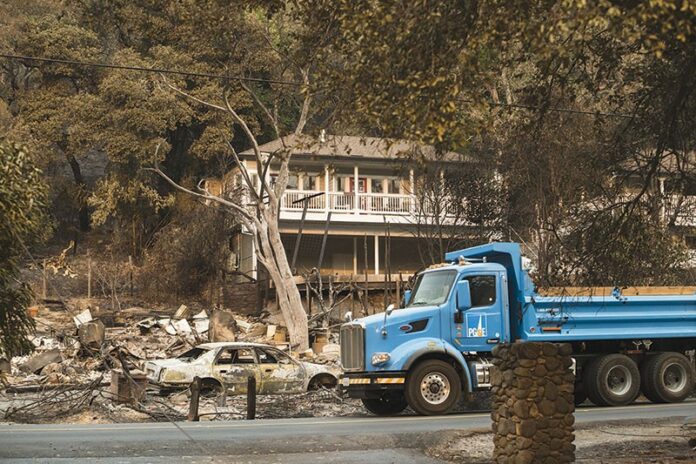A former state court judge appointed to serve as trustee for PG&E’s “fire victims” re-launched on Wednesday a massive lawsuit in San Francisco Superior Court against PG&E’s former officers and directors.
The suit alleges that the defendants breached their fiduciary duties to PG&E as officers and directors and argues that they should be held liable for damages resulting from the 2017 North Bay fires and the 2018 Camp Fire.
The background to the suit is complicated.
In order to exit the Chapter 11 bankruptcy case it filed in the U.S. Bankruptcy Court for the Northern District of California in 2019, PG&E proposed a plan of reorganization that contained the terms by which PG&E would resolve its prodigious liability to creditors.
Among the creditors were victims of devastating wildfires in PG&E’s service territory prior to the bankruptcy.
Many of the fire victim claimants were injured by or suffered losses as a result of the fires but their claims had not been adjudicated and accordingly, the amounts they were owed by PG&E were not determined before the bankruptcy.
Given the number of fire victim claimants and the complexity of their claims, it was not feasible for there to be an individual determination of the amount of their individual claims during the bankruptcy case.
In its plan, PG&E proposed to deal with that practical problem by creating a special trust called the “Fire Victim Trust” to be used to pay the fire victims as their claims were resolved.
In order to fund the payments to these claimants, PG&E proposed to transfer substantial assets to the trust.
Among the assets used to fund the trust were approximately $6.75 billion in cash to be paid in three installments and $6.75 billion worth of common stock in the reorganized PG&E. In addition, PG&E proposed to transfer to the trust all of PG&E’s legal rights and claims against the directors and officers who served prior to the bankruptcy.
The transfer gave the trust the right to take over a “derivative” lawsuit previously filed in San Francisco Superior Court on behalf of PG&E. A derivative suit is an action filed in the name of a company by a shareholder when the company improperly fails to take legal action that is alleged to be in the company’s interest.
The derivative suit was filed in 2018 but was put on hold by the bankruptcy filing. The suit alleged that the directors and officers had breached the fiduciary duties they owed to PG&E.
The potential that the suit would generate significant funds was enhanced by the fact that PG&E, as is customary with large corporations, maintained “Directors and Officers Liability Insurance” that, under certain circumstances, would cover liabilities incurred by a company’s officers and directors during the course of their service.
In order to access those potential assets, the trust assigned all PG&E’s rights to the insurance to the trust.
PG&E’s plan was approved by the bankruptcy court on June 20, 2020 and it took effect shortly thereafter.
John K. Trotter, a retired state court judge, was appointed as the trustee for the trust. Trotter had experience with fire-related litigation, having “formulated a resolution program for the 2007 San Diego fire cases and supervised the resolution of all the victims’ claims,” according to a filing in the bankruptcy proceeding.
On Wednesday, Trotter took a key step for the fire victims by filing a 53-page amended complaint in the pending lawsuit.
The complaint asserts that 15 former directors and 10 former officers breached their duties to PG&E in connection with the group of 2017 North Bay fires and also with respect to the 2018 Camp Fire.
The North Bay fires, the complaint alleges, were 21 major wildfires that collectively burned 245,000 acres, caused the evacuation of 100,000 people, destroyed 8,900 structures and killed 44 people.
The Camp Fire burned 153,336, destroyed 18,804 structures, and caused the death of 85 people, according to Cal Fire.
The complaint charges the defendants with liability for each of the incidents, though for different reasons.
The complaint alleges that the damage from the North Bay fires could have been prevented if PG&E had “implemented a de-energization program,” in which electricity to power lines can be shut off in dry and windy conditions.
PG&E’s recent “Public Service Power Shutoffs” employ de-energization as a strategy to reduce the risk of fire in hazardous weather conditions.
With respect to the Camp Fire, the complaint alleges that the fire was caused by old and failing equipment. According to the complaint, the defendants were responsible for failing to inspect and maintain the equipment despite knowing that it could cause great damage in dangerous conditions.
The complaint states that “Defendants’ gross failure to provide oversight and intervention … has led to billions of dollars in corporate liability in excess of the entire market capitalization of the Company.”
The complaint notes that during the period that the defendants served, many were collecting substantial compensation, including bonuses. Charts embedded in the filing purport to show that Anthony F. Early, a former PG&E chairman, received more than $35 million in compensation over the years 2014 to 2016.
The complaint also faults the company and defendants for failing to “clawback” (that is, recover) excessive compensation paid to directors and officers in the past.
“The Defendants put profits before safety, which has resulted in the two separate catastrophic events which are the subject of this lawsuit.”
PG&E has been subject to ongoing monitoring in a criminal case pending in federal court in San Francisco presided over by U.S. District Judge William Alsup.
The complaint quotes Judge Alsup stating at a Feb. 3 hearing that “PG&E has been a terror, T-E-R-R-O-R, to the people of California.”









